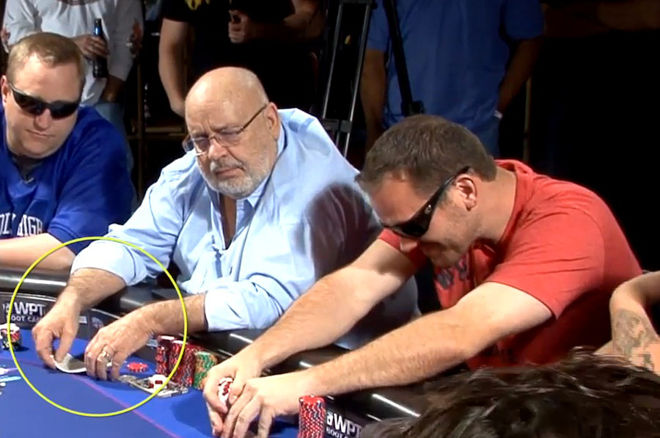HAND READING
If you start out playing small stakes games, as most poker players do, you’ll likely see a lot of erratic play that is not consistent with what you are learning about good poker strategy. This is because you are playing with a lot of inexperienced players, and also some for whom the money at stake is not significant enough to induce them to put effort into playing well.
Such erratic behavior often leads to the mistaken belief that these players could have anything, and that there is therefore no sense in trying to read their hands or make plays based on judgments about what they may hold. However, throwing up your hands in frustration will mean a quick dead-end to your poker career. Instead, you should take a deep breath and realize that information is everywhere — you just have to know what to look for and what to do with it when you find it.
In this two-part article I will address hand reading specifically and make some suggestions about how you can glean information even from the seemingly erratic and random behavior of your least sophisticated opponents.
A Couple of Misconceptions
I want to begin by addressing two common misconceptions. The first is one at which I’ve already hinted. The fact is, your opponents are not truly random with their play, and it’s not true that they could have “anything.”
Their reasons may not be your reasons and their reasons may not be good reasons, but unless they are literally throwing a die to determine their actions or going all in blind every hand then there is some method to their madness. There are some hands they’ll fold, and there are some hands they’ll never fold. Your goal is to find that method, or at least deduce enough about it to figure how to exploit it. More on that in a moment.
The second misconception has to do with the term “hand reading,” which is really a misnomer. You may have seen Daniel Negreanu on television naming the exact suits of the cards in his opponent’s hand, but that’s not your real goal.What you should be aiming for might better be called “range reading.” Your goal is not to figure out which exact two cards your opponent holds — this is usually impossible even for the best hand readers — but rather to get a sense of the entire set of hands he would play in the way that he’s played so far. In other words, it’s not about “What exactly does he have?” Rather, it’s about “What are all the things he could have?” and — more to the point — “What should I do to get the best average result against all of those possibilities?”
Once you learn to frame questions regarding what your opponents might have like this, a little bit of information can go a long way. Let’s look at an example.
Hand Reading in Practice
Suppose that you raise with 
 in early position, and several very loose players call you. We’ll stop right there — what can you say about their ranges?
in early position, and several very loose players call you. We’ll stop right there — what can you say about their ranges?
This is a situation that often leads to frustration and complaints about bad play. When your opponents play half of the cards they’re dealt, how can you ever figure out what they have? You can’t, at least not with any precision. But you can probably say a couple of important things about what they don’t have.
For example, most players will reraise with 
 or better, so the fact that no one reraised means you probably aren’t up against those hands. That eliminates some significant threats for you after the flop. Perhaps you can also say that although these players will play any remotely suited or connected hand, they won’t call with unsuited garbage like
or better, so the fact that no one reraised means you probably aren’t up against those hands. That eliminates some significant threats for you after the flop. Perhaps you can also say that although these players will play any remotely suited or connected hand, they won’t call with unsuited garbage like 
 . After all, players who will call with half their hands still fold the other half, and what could that folding range look like if not unsuited, unconnected junk hands?
. After all, players who will call with half their hands still fold the other half, and what could that folding range look like if not unsuited, unconnected junk hands?
With nothing more than those tidbits of information, you see the flop, and it’s a great-looking 

 , giving you top pair, top kicker. But still, with four or five loose players seeing the flop along with you, isn’t there a danger that someone has outflopped you? Yes, but the situation isn’t as grave as it seems.
, giving you top pair, top kicker. But still, with four or five loose players seeing the flop along with you, isn’t there a danger that someone has outflopped you? Yes, but the situation isn’t as grave as it seems.
Let’s return to the little bit of hand reading we were able to do preflop. Remember: we still have no idea what your opponents have, we just have a rough idea of what they don’t have. You don’t have to worry about overpairs, because we think 
 or
or 
 would have reraised. Likewise with
would have reraised. Likewise with 
 , not to mention that there are only two queens left in the deck.
, not to mention that there are only two queens left in the deck.


No comments:
Post a Comment